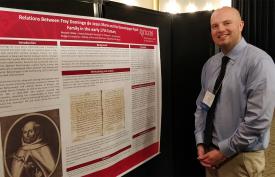How Research and Critical Thinking Skills in the Humanities Can Lead to Unexpected Opportunities
In his recent research, Max Wade has decoded 17th-century Italian letters that suggest political intrigue and marriage plots entangled with religion that are worthy of an episode of Game of Thrones. Wade, an Honors College senior from Washington, DC double majoring in philosophy and political science, became involved with the research project led by Professor T. Corey Brennan of the Classics Department through the Aresty Research Center. As Wade describes, the Boncompagni Ludovisi Archival Project draws on “newly-released and recently digitized documents from the noble family archive, many of which are being seen for the first time in centuries,” in order to help create a detailed picture of the “complex dynamics” among leading families of the era.
In an essay published on the project’s website (and as he presented as part of the Aresty Research Symposium), Wade elaborates the findings from his part of the research project, the close analysis of eight letters written between 1612 and 1624 by Fray Domingo de Jesús María. Perhaps most interesting is a letter from Fray Domingo to Gregorio Boncompagni in November 1622 concerning a possible marriage alliance between the Boncompagni family and the Gesualdo family of Naples. The letter alludes to church politics, as Fray Domingo mentions asking the Pope’s nephew, the recently named Prefect of the Congregation for the Propagation of the Faith, about the alliance. Using historical and contextual clues, Wade is able to sleuth out that Domingo is trying to arrange a marriage between a nine-year-old daughter of the Gesualdo family and one of Gregorio Boncompagni’s two sons, ages eight and nine. By teasing out Fray Domingo’s maneuvering in this letter—maneuvers that had potential political, social, and religious effects—Wade’s critical thinking and deep analysis illuminate Fray Domingo’s failure in this venture and delineate the consequences for the two families, all while indicating how that failed plot was part of the larger transformation of Italy and Europe in the early modern period.
Wade’s work illustrates how the skills developed through research and studies in the humanities can be transferred across disciplines. He became involved with the project due to his interest in the history of philosophy and religion and theology, but it pushed him beyond his normal area of academic study. As such, his work on this project has allowed him to “better place [his] own philosophical interests within the broader social and historical context of the time,” and to offer non-historians insights into “a very crucial and chaotic time for Europe and the ramifications of the time period can be felt even today.” His experience in the archive, involving both transcription and translation, is providing an important foundation for his senior capstone project on Martin Heidegger’s metaphysics and his relationship to Friedrich Nietzsche.
